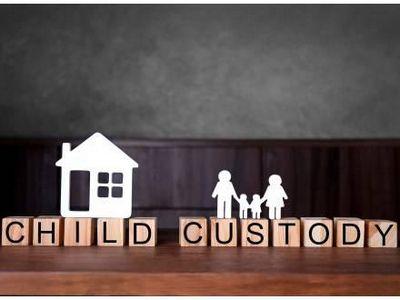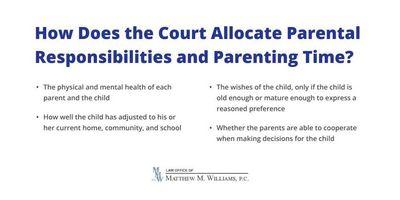Things You Need to Know About Visitation Rights in Illinois
 Custody X Change, an app for visitation and parenting plans, did a nationwide study regarding which parent in each state was more likely to be awarded more visitation time. The state of Illinois ranked 47th for the amount of time fathers received, with an average of 23.1 percent. This equals approximately 83 days per year. Unfortunately, the study did not go in-depth regarding why fathers in Illinois appeared to receive less time with their children than mothers.
Custody X Change, an app for visitation and parenting plans, did a nationwide study regarding which parent in each state was more likely to be awarded more visitation time. The state of Illinois ranked 47th for the amount of time fathers received, with an average of 23.1 percent. This equals approximately 83 days per year. Unfortunately, the study did not go in-depth regarding why fathers in Illinois appeared to receive less time with their children than mothers.
In Illinois, visitation is now called "parenting time," and custody decisions are known as the "allocation of parental responsibilities." Regardless of what it is called, courts typically assume that spending quality time with each parent is in the child’s best interests as long as this poses no risk to the child’s safety and well-being. However, there are also situations in which the courts may place conditions on parenting time, such as requiring a parent to abstain from drugs or alcohol prior to and during parenting time.
Every part of divorce has the potential to get messy and contentious, but parenting time and the allocation of parental responsibilities are often issues that are contested, resulting in never-ending arguments and children being placed in the middle. If you are considering divorce and are worried about your children and how parenting time will be divided, it can be extremely beneficial to speak to a knowledgeable Batavia, IL parenting time attorney.
Who Has a Right to Parenting Time?
The biological parents of a child typically have the right to spend time with that child. However, if unmarried parents have a child together, a parent may need to establish parentage before gaining parental rights. For example, if an unmarried woman gives birth, the father must establish paternity before he gains the right to petition the court for parenting time and parental responsibilities.
Parentage or paternity may be established through a Voluntary Acknowledgement of Paternity (VAP) document, an administrative process through the Illinois Department of Health and Family Services, or a judicial process through the court. Once the father has established paternity, he has the same right to parenting time as the mother. The husband is presumed to be the father of a child born to married parents; thus has parental rights and responsibilities.
How Does the Court Allocate Parental Responsibilities and Parenting Time?
The court’s overriding concern is the child’s best interests. Courts generally presume it is in the child’s best interests to spend time with both parents on a regular basis, absent any evidence to the contrary. The child’s best interests refer to a legal standard used in Illinois that judges must follow when determining parental responsibilities, decision-making abilities, and parenting time.
The factors considered and laws referred to are found in 750 ILCS 5/602.5. Decision-making abilities refer to whether one or both parents will make decisions on the child’s behalf, particularly concerning education, health and medical issues, religion, and extracurricular activities. The following factors are considered by the judge when determining these issues:
- The physical and mental health of each parent and the child
- How well the child has adjusted to his or her current home, community, and school
- The wishes of the child, only if the child is old enough or mature enough to express a reasoned preference
- Whether the parents are able to cooperate when making decisions for the child
- The level of conflict between the parents
- The wishes of the parents, although this is not an overriding concern for the court when determining the child’s best interests
- Whether the child has any special needs
- Prior agreements between the parents regarding decision-making for the child
- The level of each parent’s participation in the day-to-day life of the child
- Whether each parent will facilitate and encourage a close, continuing relationship with the child and the other parent
- The physical distance between the homes of the parents relative to the child and the parents’ daily schedules
- Any prior violence or threat of physical violence directed toward the child by one parent
- Whether the child has witnessed domestic abuse from one parent toward the other
- Whether one parent is a convicted sex offender
- Any other factor the court finds relevant to the situation

When Can a Court Restrict a Parent’s Visitation Rights?
Visitation or parenting time is not strictly for the parents but is presumed to be healthy for the child. Courts avoid restricting parenting time unless a restriction is needed to protect the child’s well-being. Parenting time restrictions can occur when the court believes one parent is a potential danger to the child. This could be because the other parent has made this allegation (and must prove the allegation to the court’s satisfaction) or because the parent has a felony conviction for a violent crime or a history of child abuse, domestic abuse, or child neglect.
A parent who suffers from a mental health condition or a drug or alcohol addiction that interferes with his or her ability to provide proper care for the child could have his or her parenting time restricted. However, a parent who has gone through drug rehab and is in the twelve-step program or a parent with a mental health condition that is well-controlled with medication is not likely to have his or her parenting time restricted.
Parenting time could also be limited when a parent has a serious illness that prevents him or her from caring for the child. Other reasons a parent’s parenting time could be restricted include threats of kidnapping the child, a significant geographic distance between the parents, a parent who has made no attempt to build a relationship with the child, or any other credible safety risk to the child.
What Are Some of the Parenting Time Restrictions a Parent Could Face?
Courts may restrict visitation or parenting time by placing conditions on parenting time, such as:
- No overnight visits
- Visits must occur in a specified location
- Visits must be supervised by a third party
- The amount of parenting time is reduced or eliminated
- The parent is prohibited from having certain individuals present during parenting time
- The exchange of the child between the parents takes place at a specified location or through an intermediary
The court has the authority to impose whatever restrictions are necessary to protect the child's physical, emotional, psychological, and moral well-being. In extreme cases, a parent may lose his or her right to parenting time altogether.
Contact a Kane County Parenting Time Lawyer
At The Law Office of Matthew M. Williams, P.C., we know how difficult it can be to deal with divorce and decide upon an agreeable parenting plan for your child. Aurora, IL parenting time attorney Matthew M. Williams has 15 years of legal experience assisting parents with child-related legal issues and can provide the guidance you need. Call 630-409-8184 to schedule an initial consultation.

 630-409-8184
630-409-8184













